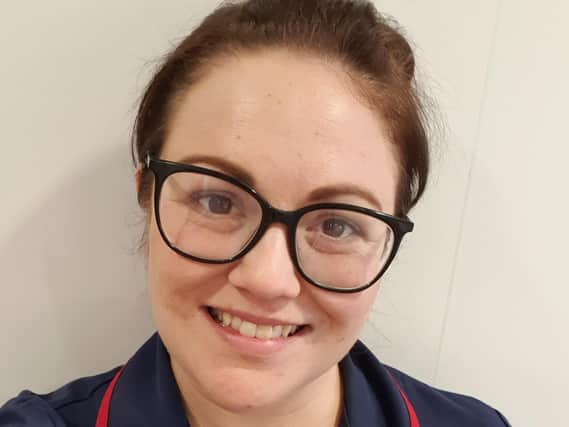Fern Dettmer works as a palliative care nurse at Thorpe Hall Hospice in the city, which is run by Sue Ryder, the national healthcare charity for palliative, neurological and bereavement care.
Fern says she is keen to encourage people to think about a "rewarding career" within the health industry and is enthusiastic to spread the message that her line of work is not all "doom and gloom", but actually, an uplifting place to work.
As a student nurse, Fern, 33 had no desire to work in palliative care. She feared it would be morbid and depressing and did not believe it could be the right environment for her. However, having promised herself that she would experience every speciality in the field of nursing before she picked one to pursue long-term, Fern found herself embarking on a palliative care placement.
More than a decade on from that first placement, Fern is now IPU Manager at the Sue Ryder Thorpe Hall Hospice.
She said: “People rarely react positively when you tell them you work in palliative care, 'poor you' with a signature head tilt is the usual response.
"I understand the stigma, because I once felt the same way about this industry, but people are so mistaken – what is depressing about being there for people when they need it most? I like when people challenge me in this way, I like being able to change people’s opinions."
Fern recalls that from the moment she walked in the building on her first day, she was completely taken with the energy that filled the space. Across all her other placements, work had
felt panicked, rushed and the care she was able to give patients felt limited. However, Fern found that the atmosphere at her palliative care placement was totally different. There was no stress, there was no rushing around prepping patients for invasive treatments - or anxiety around something terrible happening. For these patients, the worst had happened. And for most, this had already been accepted by the time they entered the hospice.
Fern comments: “Nursing in a hospice is a completely different pace of work to other areas of nursing. There’s a huge sense of community - largely because we have far more time to get
to know and care for our patients, and in many ways them, us.”
Alongside her nursing, she has several managerial responsibilities, including heading up an entire team of senior nurses and team leaders at the hospice.
Explaining more about her attitude to the stigma of palliative care, Fern says: "I like being able to change people’s opinions. I tell people that most of us come into this world with a plan, why can’t you implement one when you’re dying?
"The reality is that whilst dying is a difficult part of life for many reasons, it is still a part of life, and one that we are all going to have to face. There is no reason why death can’t be a powerful and beautiful experience.”
Despite loving her job, Fern recognises that there are some very challenging elements to it. Hospices encourage relationships to be built between staff and patients, this makes saying goodbye to the patient, when the time comes, particularly sad. Fern says that the hardest part of all is seeing relatives and friends in pain after their loved one has died.
“We don’t only build relationships with the patients, but their relatives become part of our lives too," she says. "It can be incredibly difficult to see people you grow to care about break
down, we recently had a young man of Muslim faith whose mother never fully accepted that he wasn’t going to get better, and when he died she began covering him in holy water and sobbing. Nothing can prepare you for seeing people suffering in this way.
"It’s heart-breaking to see young families going through such tragedy, we offer a lot of aftercare and support to young widows/widowers."
Fern adds: "There’s no denying that some days can be extremely distressing, but I find that even on the hardest of days, dealing with death only helps you to appreciate what you have even more.
"Supporting people during the last stage of their life involves a variety of different things. The nurses and the palliative care team do everything in their power to grant people’s last requests in any way they can. Most people think that we spend our days dishing out pain relief to dying patients, there is, of course, an element of that, but the reality is that we spend most of our
time planning and pulling strings to host whatever weird and wonderful requests our patients are desperate to see through."
Fern remembers a while ago, she had a woman who was going to miss out on her final annual holiday to Blackpool with her family. She was understandably very upset, so her daughters came to the team and together they hatched a plan to make Blackpool come to her."
Fern says: "We set up a room covered in images of Blackpool beach, we had sand, a fish and chip stand and music – she was thrilled. It was so much fun to put together, and just utterly heart-warming to see her thoroughly enjoying herself.”
During Fern’s decade at the hospice, her and the team have organised weddings, cinema nights, world cup stadiums and much more – all within the confines of the building. If a patient has a request that lies outside of the hospice, the team will also do their absolute best to get them there.
“There are so many elements of my job that I love, but I think the part that makes me feel most fortunate is seeing the whole team absolutely buzzing about managing to move a patient back home, allowing them to spend their last days in a familiar comforting place," says Fern. "Just this week the ambulance team came in early, completely unpaid, in order to take a patient home. I love seeing the selflessness of people at times like these. There is no denying that the lows are low, but the highs are so much higher.
"I often tell people that if you are ever in doubt of humanity, then you should spend a little time in a hospice – it might just change your mind.”
For more information visit Sue Ryder.



